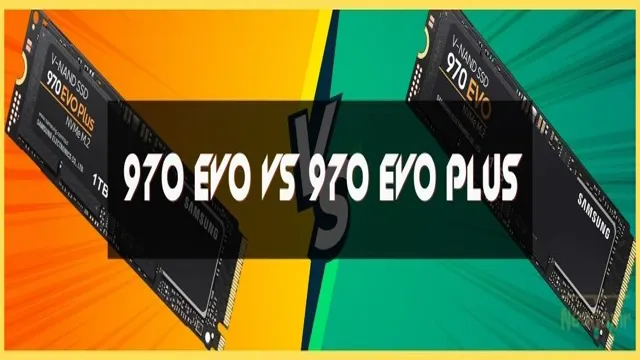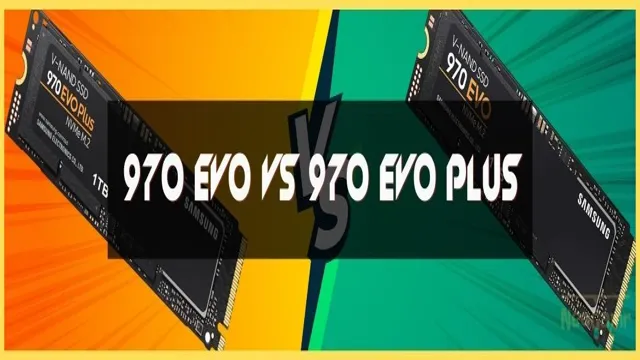When it comes to buying an SSD, you want to invest in the best one suited for your needs. The Samsung EVO series, consisting of the 970 EVO and EVO Plus, has been making waves in the market. But which one is better? The answer is not as straightforward as pointing out one as the clear winner.
It depends on what you’re looking for in an SSD. Both the 970 EVO and EVO Plus have their unique features and strengths, so it’s vital to understand them before making a decision. In this article, we’ll delve into the differences between the two and help you determine which one to choose.
Are you a gamer looking to reduce your game’s loading times? Or perhaps you’re a professional who needs a faster storage solution for intensive workloads? Whatever your needs may be, we’ve got you covered. Keep reading to find out more about the Samsung 970 EVO and EVO Plus.
Performance Comparison
When it comes to choosing between the Samsung 970 EVO and the 970 EVO Plus, the question on everybody’s mind is which one performs better? Well, the answer is the Evo Plus. The EVO Plus is faster and has higher read/write speeds than its predecessor, the EVO. While the EVO is still a great SSD, the EVO Plus takes performance to the next level.
Burst speeds are something to consider too, as they determine how fast the SSD can perform tasks that require a lot of data. In this case, the EVO Plus is much better with higher read/write speeds and a lower latency. Overall, if you’re looking for performance, then the Samsung 970 EVO Plus is the SSD for you.
It’s faster, more efficient, and has higher burst speeds than the Samsung 970 EVO.
Read/Write Speeds
When it comes to choosing the right storage solution for your computer or other devices, read/write speeds are an important factor to consider. These speeds refer to how quickly data can be transferred to and from the storage device, and they can have a significant impact on performance. Solid-state drives (SSDs) typically offer faster read/write speeds than traditional hard disk drives (HDDs), making them ideal for tasks that require frequent data access or transfer.
However, the specific read/write speeds of a storage device can vary based on a number of factors, including the interface type, the controller, and the type of memory used. It’s important to compare the read/write speeds of different storage options to determine which one is best for your needs. Keep in mind that faster speeds may come at a higher cost, so you’ll need to balance performance and budget when making your decision.

Sequential vs Random Performance
When it comes to hard drives or solid-state drives, a crucial aspect to consider is sequential vs random performance. Both factors play a significant role in the overall performance of a computer. Sequential performance refers to the speed at which a drive can read or write data in a linear, predictable pattern.
On the other hand, random performance measures how quickly a drive can access and transfer data in a non-linear, unpredictable manner. Sequential performance is excellent for tasks such as video editing, where large amounts of data need to be processed and transferred quickly. Random performance, on the other hand, is crucial for everyday tasks such as opening files or browsing the internet, where small amounts of data are accessed randomly, and performance can become quickly degraded without quick random access.
When buying a hard drive or solid-state drive, it’s important to consider your specific needs and to balance sequential and random performance to achieve the best overall performance for your use case. Remember to always look for drives with high sequential and random read/write speeds to ensure optimal performance.
Capacity and Price Comparison
When it comes to choosing between the Samsung 970 EVO and the 970 EVO Plus, one of the biggest factors to consider is capacity and price. The EVO Plus offers a higher capacity option of up to 2 TB compared to the EVO’s max capacity of 1 TB. However, with this boost in capacity comes an increase in price – the EVO Plus can cost up to 20% more than the EVO.
It’s important to consider your storage needs and budget when making a decision. For those who require more storage space and are willing to pay a higher price, the EVO Plus may be the better choice. But for those who need a reliable and fast SSD at a more affordable price point, the EVO is a great option.
Ultimately, both SSDs offer exceptional performance and durability, making either choice a reliable investment for your computer.
Available Capacities
When it comes to choosing the right capacity for your needs, there are a few things to keep in mind to make sure you’re getting the best value for your money. First, consider what you’ll be using the device for – if you’ll be storing mostly text files or small images, a lower capacity may suffice. However, if you plan on storing large video or photo files, it’s worth investing in a larger capacity.
It’s also important to keep in mind that not all devices offer the same capacities – some may have a wider range of options than others. When comparing prices, make sure you’re comparing devices with similar capacities so you can get an accurate idea of which option is really the best value. Overall, taking the time to consider your needs and do some research can go a long way in helping you choose the right capacity for your needs.
Price Points
When it comes to purchasing a new device, one of the most important factors to consider is the price point. A capacity and price comparison can help you determine which device offers the best bang for your buck. For example, let’s compare two laptops with similar specs but different prices.
Laptop A has a storage capacity of 256 GB and costs $999, while Laptop B has a storage capacity of 512 GB and costs $1,19 In this case, Laptop B offers double the storage capacity for only an additional $200. However, if you don’t need that extra storage space, Laptop A may be the more affordable option for you.
It’s important to take into account your specific needs and budget when making a purchasing decision. By doing so, you can ensure that you get the most value for your money.
Durability and Endurance
When it comes to choosing between the Samsung 970 EVO and the 970 EVO Plus, one of the key factors to consider is durability. Both SSDs feature Samsung’s own V-NAND technology and are built to last. However, the 970 EVO Plus boasts an improved endurance rating with up to 600TBW (terabytes written) compared to the 970 EVO’s 300TBW rating.
This means that the 970 EVO Plus may have a longer lifespan and can handle larger workloads over time. Additionally, the 970 EVO Plus features a new firmware algorithm that helps to improve its lifespan, making it a great choice for users who need a reliable and durable SSD for their high-performance computing needs. Overall, the 970 EVO Plus is the better choice for those who prioritize endurance and longevity in their SSDs.
TBW (Total Bytes Written) Ratings
When it comes to SSDs, durability and endurance are two of the most important factors to consider. One way to measure these factors is through TBW (Total Bytes Written) ratings. Essentially, TBW refers to the amount of data that can be written to an SSD before it starts to experience performance issues or failure.
The higher the TBW rating, the better the durability and endurance of the drive. So, if you’re looking for a solid state drive that can stand up to heavy usage over time, it’s important to pay attention to its TBW rating. Of course, there are other factors to consider as well, such as read and write speeds, capacity, and cost.
But TBW is definitely one of the most important metrics to keep in mind when shopping for an SSD that will last.
Warranty Comparison
When it comes to purchasing a product, it’s important to consider its durability and endurance, especially when evaluating its warranty. A warranty is essentially a promise from the manufacturer that the product will perform as intended, and the length of this promise is an indication of their confidence in its durability. A longer warranty period typically means that the product is built to last, and the manufacturer is willing to vouch for its endurance.
However, it’s also important to realize that not all warranties are created equal – some may come with exclusions or limitations, while others may offer more comprehensive coverage. It’s important to read the fine print and understand exactly what is covered under the warranty, as well as any conditions or requirements for making a claim. By doing so, you can make an informed decision about which product to choose and have peace of mind knowing that you are protected in case of any issues.
So always remember to check the warranty before making a purchase, as it could be the deciding factor on the product’s durability and endurance.
Conclusion: Which One to Choose?
In the faceoff between the Samsung 970 EVO and EVO Plus, it’s clear that both deliver impressive speeds and performance. However, the EVO Plus takes things to the next level with its superior sequential write speeds and improved thermal management. So, if you’re looking for a solid-state drive that offers lightning-fast data transfer rates and reliable endurance, the Samsung 970 EVO Plus is the clear winner.
It’s the ultimate choice for power users, gamers, and anyone looking to take their storage to the next level.”
FAQs
What is the difference between Samsung 970 EVO and 970 EVO Plus?
Samsung 970 EVO Plus has a better endurance rating, improved write performance, and is slightly faster than the 970 EVO.
Which one should I choose between 970 EVO and 970 EVO Plus?
It depends on your usage. If you require better write performance and endurance, then go for the 970 EVO Plus. However, if you are looking for an affordable option, then 970 EVO can be a good choice.
Can I use 970 EVO Plus as an external drive?
Yes, you can. The 970 EVO Plus comes in an M.2 form factor, and you can get an M.2 to USB enclosure to use it as an external drive.
What is the warranty period for Samsung 970 EVO and EVO Plus?
Both drives come with a 5-year limited warranty from Samsung.
